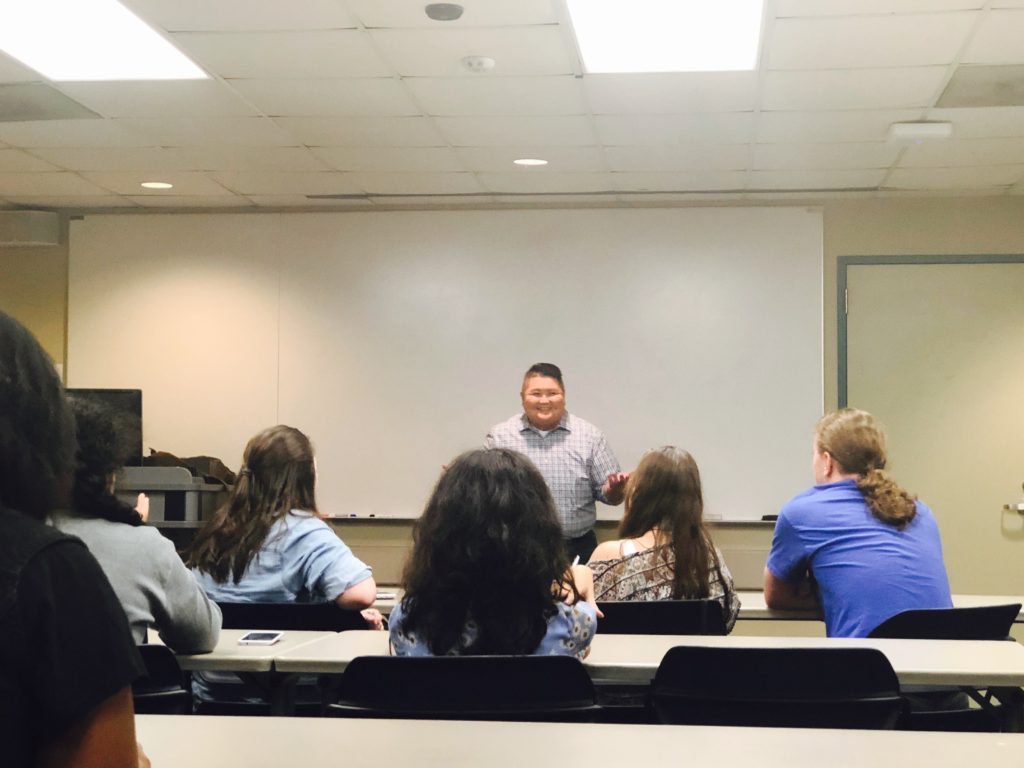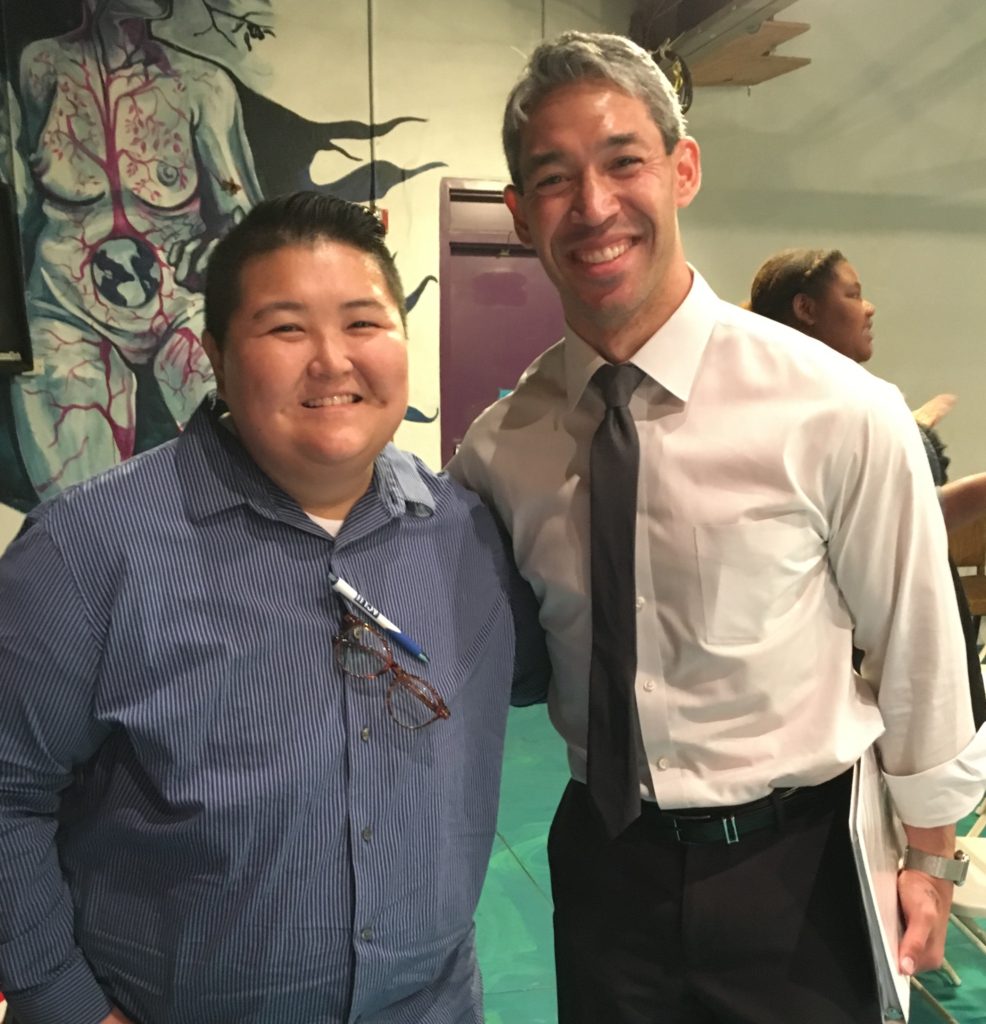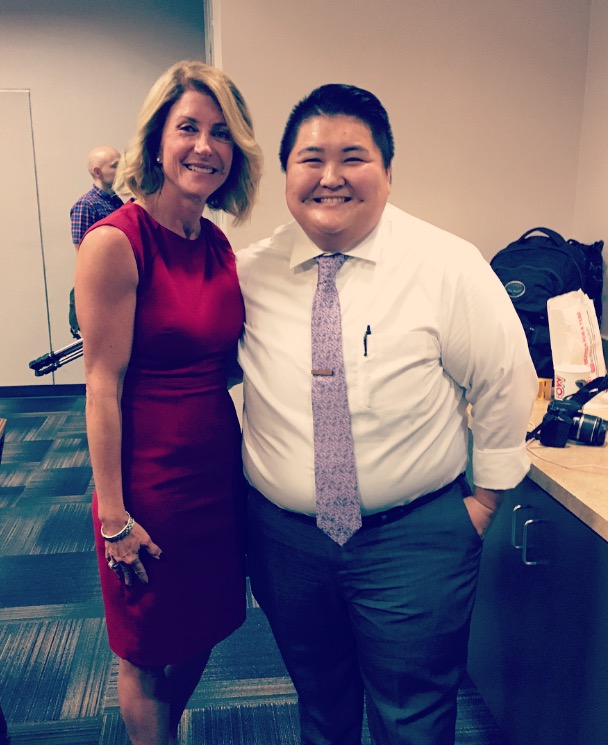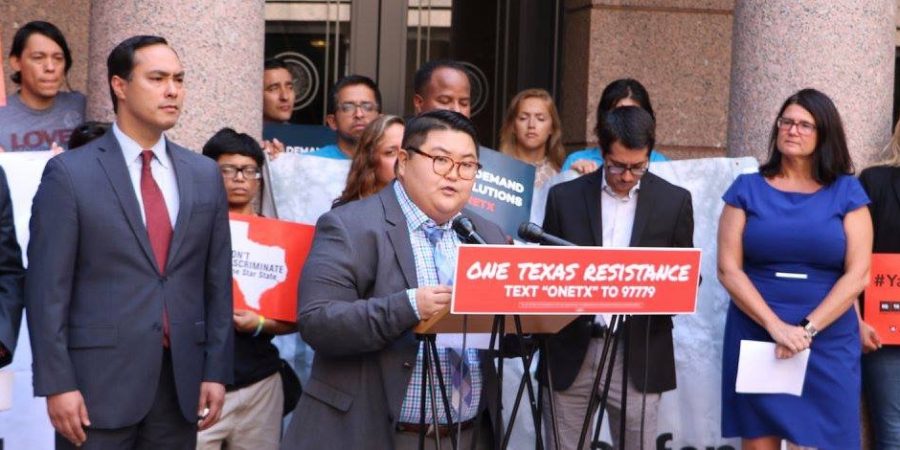Emmett Schelling, a loving father and partner who also identifies as trans man, has a resume that makes most of us look like lazy bums.
Born in Seoul, South Korea, Schelling was adopted and raised in Ohio, then moved to Texas several years ago. After many years of working in the business world in corporate management and doing activism on the side, Schelling began working in activism full-time in the summer of 2017. He spends his days in different parts of Texas advocating for LGBTQ rights, with a focus on activism for the trans community.
He is currently on the steering committee for the Human Rights Campaign’s San Antonio chapter and is the president of the San Antonio Gender Association (SAGA), which offers support groups and resources for transgender and non-binary people. Emmett was also just appointed to be the Executive Director of the Transgender Education Network of Texas (TENT).
His work takes him all across the state, mostly shuffling between San Antonio, Houston, and Austin, forcing him to be a bit of a nomad. “Every region is different and poses different obstacles to the trans community. While there’s state legislation that would endanger everybody, there are specific and unique characteristics that every region faces,” he says.
Read on for Schelling’s interview, where he discusses his own transition, what it’s like doing advocacy and activism work 24/7, and the gratification he gets from it.
Profiles in Pride: For a little background, when did you come out and start transitioning?
Emmett Schelling: I know we say no two people look the same, but mine really doesn’t look like anyone else’s that I have come across yet. Ever since I’ve been pretty little, I’ve always had predominantly bro-ey male friends and had a more masculine appearance. It wasn’t a huge ta-da thing for me. For the majority of my life, even before I “officially” transitioned, people who didn’t personally know me generally used male pronouns with me. My mom would make a joke that she had two sons and two daughters, because my middle name is my Korean name, so it was like a play on words, but also an observation about my personality. My sister said when I officially came out to her, everything made so much more sense about who I was.
I changed my name in my early thirties. It’s an odd thing; at home, a lot of people referred to me by my last name since it was more fitting. Then I changed it officially because I knew I needed to. But I also wanted my daughter to be pretty well grown — a large part of why my official transition was delayed was because I didn’t want who I was to hurt my kid. That’s hard. Because well-meaning parents screw their kids up all the time. It’s not for lack of love in some cases, but who they are as people trying to raise other people.
My transition didn’t feel like a stepping out of one identity into another one. It felt more procedural. It was anti-climactic in a way, for a lot of people, because it wasn’t a big reveal, where with some people, you do have that.

PIP: A lot of your activism is related to politics. Have you always been politically minded?
ES: I’ve always been fairly political. I was raised in a religious household and was actually a young Republican. I feel like my beliefs have evolved over time, and I’ve gained more understanding for issues and people, even economics that are faulty and don’t work. But at the end of the day, I don’t feel like my principles from then to where I am now have shifted a huge amount. If anything, I feel like the shift has been in the party itself and seeing the complete disregard for so many people just because they aren’t white, heterosexual, Christian, upper-middle class people.
It’s tough because a lot of people back home voted how they’ve always voted, which is conservative. They’re good, decent, honest, hardworking people. It’s really hard for me to see this complete upheaval of any sort of progress that we’ve made as humanity in society to all the divisiveness, and to sort of reconcile who I know these people to be, but also they turn around and support policies that want to eradicate a whole community of people.
The message I received from my faith was to do what you could in the world to make the world better and good and kinder, and walk in humility and forgiveness. That doesn’t seem to be the message anymore.
Everything I see done in the name of religion now really flies in the face of all of that. It’s so hard, because I know so many people have lost relationships due to politics lately, and I never get away from them. But also, for people to say, “I’m not going to worry about politics” and not realize how much of a privilege that must be to exist in a world where they don’t have to worry about politics at this point — in terms of existence and well-being, and they’re just worried if they’re gonna have money to take three vacations this year instead of two.
And then to decry anything about white privilege existing really confounds me. Because they back it up with their faith, and I don’t understand at all how the two conflate. I feel like the Jesus I was raised to know has been sold out for tax breaks and white supremacy.

PIP: What led you to start getting involved in activism for the trans community?
ES: I’ve always been pretty engaged in community in some sort of way. My mom really instilled the importance of contributing to community, through volunteering or whatever you could do in terms of making the world a better place to one day exist in.
Activism with trans-specific issues was borne more out of necessity. I got more involved in the trans community down here in Texas. I had some really personal experiences that impacted me negatively solely due to my being trans. That made me look into the issues deeper. After going as a member, I ran for president of SAGA because I felt like I needed to do more in terms of helping my community in some sort of a leadership capacity.
Then the 85th session of the Texas legislature was an unprecedented attack on LGBTQ+ people. It specifically targeted trans people, and even had proposed legislation that had targeted kids that were LGBTQ in the foster care system. People who wanted to adopt kids or foster them that didn’t fit with the status quo of traditional. Being able to get state funding while still discriminating against people based on your religious beliefs, it really to me is wrong on principle.
PIP: So how did you get involved and fight back?
ES: When SB6 [“the bathroom bill”] hit the Senate hearing committee, I testified at the Capitol in Austin during that, and so did my daughter. Her testifying — that was really hard on me as a parent, to hear the sincerity of what she had written, but also to see the honest fear that she had for me. Not because she’s not supportive, but one of the things she stated was, “I only have one parent, please don’t increase the chance of me not having any parents by passing laws that are going to directly target and contribute more harm.”
That was a very honest, raw moment. She’s usually more flippant, so seeing that, it really impacted me because I realized how many other kids are feeling this way, how many other family members and loved one having this fear for their kid. I knew it very much on the surface, but it really hit at a depth that I didn’t feel it was optional to not do more.
I also testified for HB2899, which was so the state could suspend the non-discrimination ordinances that the municipalities had passed. Then HB3859, which opened the door to discriminate against couples wanting to adopt and/or foster and kids in foster care based on religion. My daughter testified in those as well. HB3859 passed into law on September 1, 2017. When I watched the live feed as it passed on the House floor, my partner and I began to cry because of the ramifications we knew it would bring for so many.
A large part of my focus was to get trans people from the San Antonio area to Austin due to the close proximity, and parents with trans kids to come testify, do interviews, go to rallies, and be visible and have their stories heard to really put a face on the people, to the Texans who were getting targeted. Through their stories and humanity, it largely dispelled the narrative that was being pushed.
I was recently appointed to be the executive director of TENT, a state-wide trans org. We’re going to focus on policy and education, and engaging trans Texans throughout the state to galvanize the separate regional populations and unite to fight against any anti-trans legislation.
We really need to further educate people about the trans community and who we really are. It’s a sad day when we’re at the point where we need to humanize any group of people for them not to be targeted by discrimination and harmful legislation. That it’s such an aggressive push to erase people out of society just because we don’t know anybody or don’t understand a journey — that we have the arrogance to say that because we don’t agree with somebody, that they shouldn’t exist.
There are a lot of obstacles that trans people in Texas already face without horrible legislation aimed at them. Trying to slowly improve the quality of life overall is really critical. With TENT, I really value the ability to lend support and resources. What I’m trying to do is give local organizations the tools to be the best they can be in their own localities and municipalities. There’s no need for a state org to come in and swallow up all of these local groups, because they’re doing great things in each corner of Texas and all throughout. It’s really to encourage the groundwork they’ve already laid themselves and be able to support it and perpetuate it, and propel it in the right direction.
PIP: What’s it like being a full-time transgender rights activist rather than a volunteer?
ES: It’s a large sense of responsibility for me. I don’t want to say it’s a burden, but in a sense it is, because you’re not doing it solely for yourself. Chances are, I won’t see the full extent of the change that’s being created by a bunch of incredible people right now. It’s more of an idea that you need to do what you can with what you have to create an environment for these kids to be able to not just survive, but to thrive in. Because kids deserve that, people deserve that.
Everybody deserves an opportunity to exist in a place that doesn’t feel dangerous or out to single somebody out because of who they are and who they love.
I’m lucky that my partner is an outreach and field coordinator for a progressive organization in her career, because a lot of days, when they’ve been really hard, I don’t need to explain intricacies of why it was draining, because she’s doing the work too. She understands. During special session [when Texas legislators tried to pass the “bathroom bill” again], I really don’t know how I could have gotten through some of those days without her emotional support. And not just being my significant other, but being my best friend.
The passion that my partner approaches her work, and the dedication she puts into it really motivates me to always set the bar higher for myself. She’s so dedicated and genuine, to the betterment of the world, for everyone. Her sense of equality and justice is really paramount to anyone else I’ve ever met. My partner is one of my three heroes for sure, besides my mom and my kid. I think she just really embodies what I wish all of humanity would look like.
PIP: Does your activism feel like a 24/7 job?
ES: I just feel like there’s never an end to things; it’s hard for me to shut off or shut down, because there’s always something that’s happening or something you can be doing. For me, it’s emails or organizing or strategy or trying to figure out funding. Even just direct support when people reach out. I feel like it’s spinning plates sometimes.
PIP: Despite the challenges, what gives you a sense of hope and gratification from your work?
ES: I think the fact that there were 30+ anti-LGBTQ bills introduced in the Texas legislature this session, and all but one were stalled through the combined efforts of so many people. Not just from paid folks that belonged to organizations, but just real people who cared so much that they showed up and sacrificed their time and their energy and continued to come back and show up. I think that was a sense of relief, like I can breathe for a second.
But knowing that 2019 [when the Texas legislature meets again] is around the corner, and seeing some of the moves that the more extreme Republican politicians are making during the gap in between sessions, even in regards to the primaries — like how Governor Abbott endorsed the Tea Party candidate running against Sarah Davis, a moderate Republican. She’s pro-reproductive justice, and she was not a fan of anti-trans legislation or any sort of discriminatory legislation. That’s a real messed up thing, for them to basically either give a seat to a Democrat just to get her out, because it shows a very worrisome strategy; that they don’t want any moderate voices anymore. They just want religious extremists.

But I’ve had a lot of gratifying moments. I’ve gotten to know so many incredible leaders from throughout Texas and gotten to know some really amazing trans kids and their parents.
Seeing their parents’ support and how hard they fight for their kids, it’s encouraging to see, because I see change just in support of parents. Because it makes me wonder how would my life have been different, and knowing that these kids aren’t going to be trapped inside a stranger as they live their childhood. That’s incredibly gratifying.
One particular example of what keeps me going: there’s a trans kid in high school from San Antonio, and he and his mom got really involved in the legislature. He came and spoke at and participated in these things. He was in marching band, and for people in marching band, it’s a big deal and they’re really passionate about it. He quit marching band so he could come be an advocate for these other trans kids. Seeing him having to sacrifice something he really loved to do just to advocate was this double-edged sword; that really sucks that you have to do that for this, but at the same time, seeing his passion and willingness to sacrifice for the greater good, that was so moving. He and his mom are just an example of some of the best people I’ve met while doing this.


[…] himself a transgender man, has led TENT since 2017, the same year he began working in activism full-time. The Texas organization is the largest transgender-led and transgender-focused in the state, and […]
[…] himself a transgender man, has led TENT since 2017, the identical yr he started working in activism full-time. The Texas group is the biggest transgender-led and transgender-focused within the state, and seeks […]